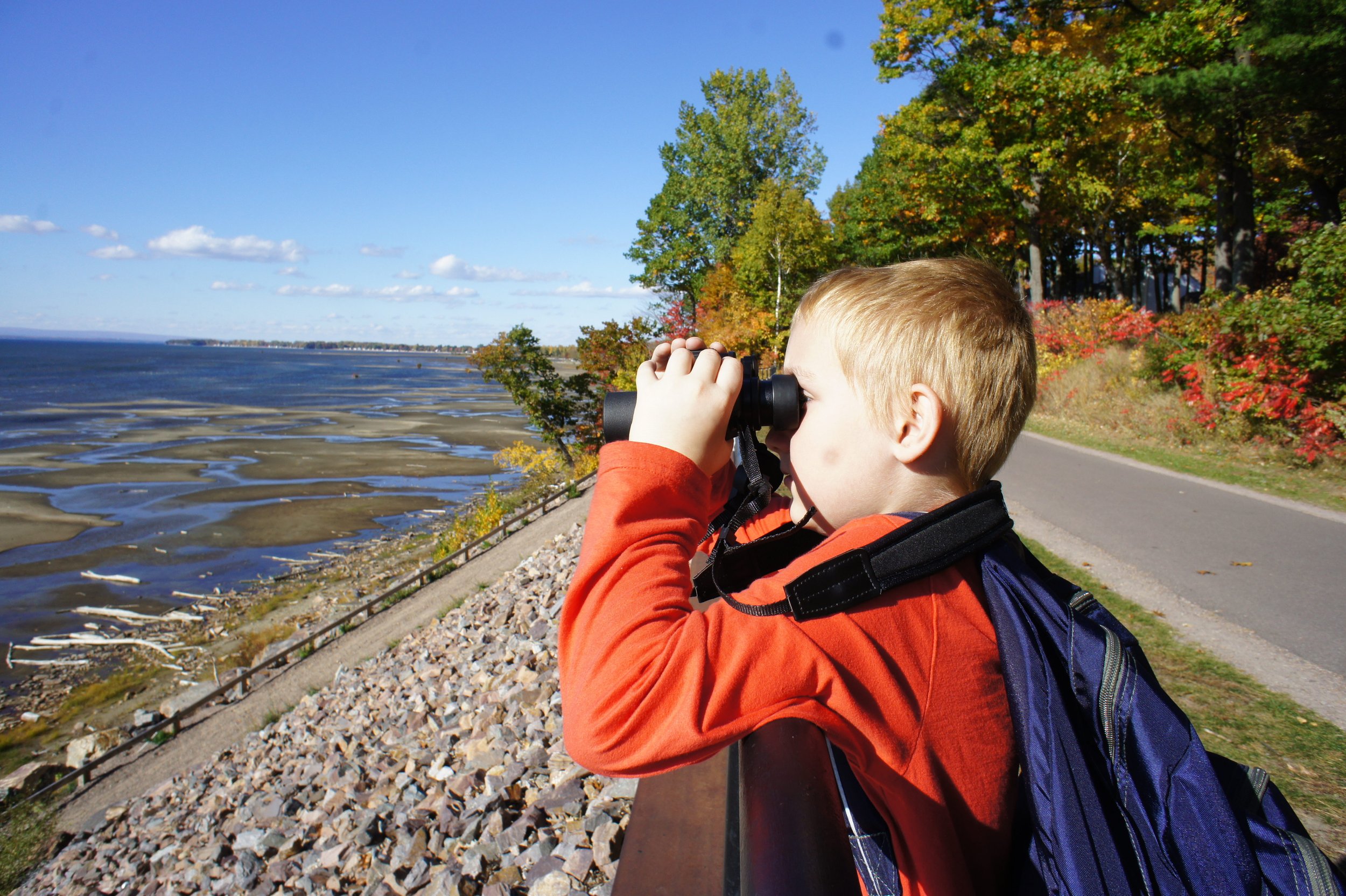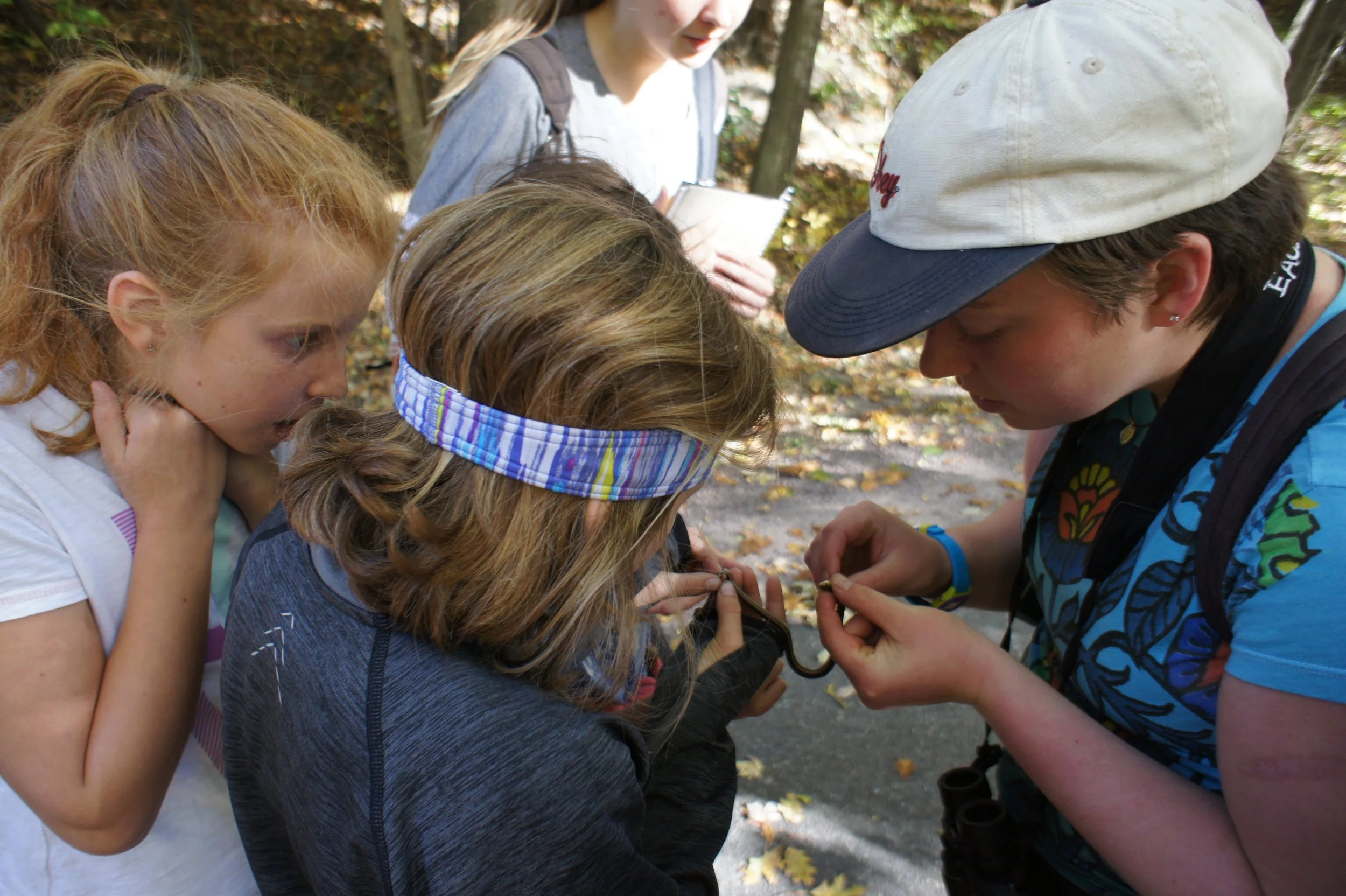Birding to Change the World
By Nathaniel Sharp
11/15/2016
Every Wednesday, I hand my bird buddy Colby a pair of binoculars and talk to him about his week before we set off on an adventure. We marvel at grasshoppers hopping around our feet and Turkey Vultures circling above our heads. In just two outings, Colby has learned how to identify Turkey Vultures by their distinctive wing shape, and his knowledge of birds continues to increase.
I’m enrolled in “Birding to Change the World,” an Environmental Studies class that pairs college student mentors with elementary school students from Flynn Elementary School in the New North End of Burlington. This is not a lecture-style class; instead, the children and their mentors see each other as “co-explorers” learning about the natural world together. Every interaction with nature is a learning experience for all students involved.
My co-explorer is helping me to see the world through new eyes. As we walk down the Burlington Bike Path, we stop to scan Lake Champlain for ducks and geese, our elbows perched on the railing and our binoculars pressed to our eyes. When we get to a particularly large patch of Jewelweed, known for its use in preventing the effects of poison ivy, Colby stops to harvest the flowers for the poison ivy medicine he plans to make with several other students. We are surrounded by birds, insects, frogs, and snakes as soon as we enter the Derway Island Nature Preserve, when a free-for-all of exploration ensues. The kids all have their own favorite patches of Derway. Some run off into the woods in search of their favorite tree or the fort they constructed last week, others run to the Winooski riverbank and follow the tracks of herons and beavers in the mud. Colby and many others stick to the trails, moving Woolly Bear caterpillars out of harm’s way and stopping to view any birds that can be seen from the path.
Colby’s curiosity and enthusiasm are infectious; many of my classmates have never looked at nature in the same way as these children who are allowed to run wild and explore it. Lesson plans are thrown out the window and freedom of exploration is encouraged. Explorations develop into learning moments on many occasions, for example, when a dead robin is discovered or an unusual plant is found along the trail. Children are encouraged to question everything, and every week UVM students are sent home with two homework questions assigned by their Flynn bird buddies. So far I have been asked such questions as “What do Bald Eagles eat?” and “What are the 5 rarest leaves in Vermont?”.
The mind behind this class is UVM Professor Trish O’Kane. She, much like many of the birds seen at Derway, is a “Neotropical migrant.” After spending 10 years doing civil rights investigative journalism in Central America, she moved to Alabama, then New Orleans, then Wisconsin before finally arriving at UVM and introducing “Birding to Change the World.” O’Kane spearheaded a similar class at the University of Wisconsin-Madison with middle school students at an urban park. She has brought that same formula to UVM.
Trish believes that learning through experience in the outdoors is effective for both elementary school and college students because “it shows you, it doesn’t tell you.” She also declares that “any bird that provides a child with a portal to the outdoors is a teacher,” and there are certainly a lot of teachers in Derway. Children with no interest in birds at the beginning of the class can already identify many of Vermont’s common species and even more importantly, they are learning about the importance of preserving good bird habitat like Derway.
One of the greatest successes of the class is that, without even being aware of it, children who rarely get the chance to go outside and explore the outdoors are developing an environmental
ethic. Simply getting them outside causes them to engage with their environment, and then want to learn more about it and protect it. Many of the children in this class might have the opportunity to be first-generation college students, and they are beginning to realize that their passion for nature can take them all the way to college. Just recently, one of Trish’s former students set up a similar program at Hunt Middle School, which many of the children from Flynn Elementary will be attending in the coming years. Developing a pipeline that will keep these kids interested and engaged in the natural world through middle school and high school could lead them to be future college students with a passion for the environment.
The class has been a resounding success: there are even more children in attendance this semester than last, and, as Trish puts it, “children vote with their feet.” Even the younger students at Flynn are beginning to ask if they can join the nature club they have heard so much about from their older classmates. In just a few short weeks, I have seen first-hand how birding has changed the world of everyone involved in this class and I know it will continue to as long as students are willing to get outside and explore. As Colby puts it best, “Sometimes having fun means getting your hands dirty!”

